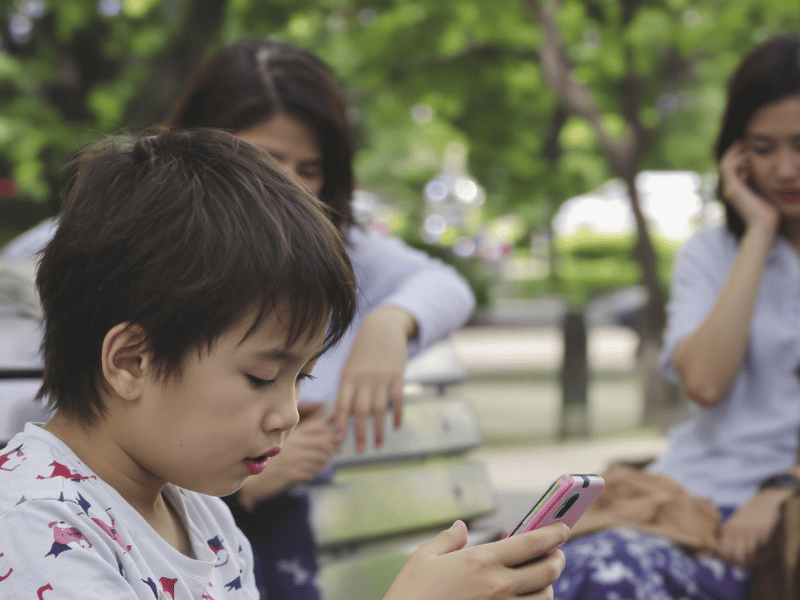Keeping Children Safe Online: The Urgent Need for Digital Awareness in Vietnam
Safeguarding Children Online in Vietnam

My children were being loud in the restaurant.
My daughter, seven years old, pushed my son, six years old. My son pushed back harder.
We were on the brink of a complete meltdown.
The other diners looked up from their bowls, judging my family.
I knew what would work. I pulled out the phone. I opened YouTube Kids. The kids went quiet.
Crisis averted.
Sound familiar?
In Vietnam, we parents choose this peace a hundred times a day. None of us know what it costs.
And Vietnamese children, like those worldwide, are growing up in a digital landscape full of both opportunities and dangers.
And while the internet provides educational tools and entertainment, its also exposing children to serious cyber risks, including online exploitation, cyberbullying, and privacy breaches.
With 87% of Vietnamese children accessing the internet daily - and the vast majority accessing it through smartphones, it is important that families and schools take these threats seriously.
The Growing Need for Online Safety in Vietnam
Vietnam has taken significant steps to protect children online, recognizing the urgent need to regulate digital spaces.
The Code of Conduct for Protecting Children in the Online Environment, introduced by the Ministry of Information and Communications (MIC), establishes guidelines for safe digital interaction.
This code targets five groups: parents and teachers, general internet users, media organizations, platform operators, and children themselves.
The goal of this code is to create a safer, more responsible digital environment by encouraging positive online behavior, strengthening privacy protections, and increasing reporting of harmful content.
But unsurprisingly, enforcement remains a challenge.
Awareness is low, and more effective messaging is required to reach families, schools, and technology providers in a way that makes an impact.
Understanding Digital Footprints
Every online action leaves a trace. A comment, a shared image, or a social media post contributes to a child’s digital reputation, potentially affecting future education and job opportunities.
Yet, many Vietnamese children and caregivers underestimate online risks. Only 33% of children ranked talking to online strangers as “very risky”, compared to 52% of caregivers.

Parents and teachers must educate children on responsible sharing and the concept of a “digital tattoo” — the idea that what is posted online can be permanent. Teaching children to pause and think before posting can help them protect their privacy and future.
The Reality of Cyberbullying and Online Exploitation
Cyberbullying is a growing concern, with 14% of internet-using children in Vietnam reporting exposure to sexual content intentionally, and 23% encountering it accidentally.
Meanwhile, 1% of internet users aged 12-17 in Vietnam—an estimated 94,000 children—were victims of online sexual exploitation in the past year.
The risk is real, yet under-reporting remains a significant barrier due to cultural stigma and the lack of clear reporting mechanisms.
The Disrupting Harm in Viet Nam report highlights additional concerns:
- 0.5% of surveyed children had sexual images of them shared without permission.
- 2% of 15-17-year-olds had accepted money or gifts in return for sexual images or videos.
- 1.9% of children received unwanted requests to talk about sex or sexual acts.
These numbers point to a disturbing trend: online grooming is evolving, and children need to be equipped with the skills to recognize manipulative behavior and seek help.
Vietnam’s Response and Challenges to Calls about Child Protection
While Vietnam has made strides with legal frameworks such as the Law on Children and Government Decree No. 147, gaps still exist:
- The law lacks clear definitions for child sexual abuse material (CSAM) and online grooming, leading to enforcement challenges.
- Victim reporting remains low due to fear of stigma and unclear support services.
- Law enforcement units handling child exploitation cases lack specialized training and dedicated resources.
Despite these challenges, Vietnam is actively working towards a safer digital space.
Evidence of this can be found by looking at the National Programme on Child Online Protection for 2021–2025 and Vietnam's participation in ASEAN’s Regional Plan of Action for the Protection of Children from Online Exploitation and Abuse.
These are positive developments.
Parental Involvement: The First Line of Defense for Child Protection Online
Parents play a crucial role in protecting their children online. However, research shows a disconnect between parental restrictions and children's online behavior.
Over 50% of children surveyed said they couldn’t go online when they wanted because caregivers restricted access, yet this does not always translate into increased safety.
Instead of strict bans, parents can:
- Educate children about digital risks and responsible online behavior.
- Use parental controls and monitor online activity without invading privacy.
- Encourage open conversations so children feel comfortable reporting any online concerns.
Schools and Digital Literacy Education
Vietnamese schools must incorporate online safety education into curriculums. While the Vietnamese Children’s Online Protection Club has been promoting awareness, more structured programs are needed. Schools should:
- Provide regular training for students and teachers.
- Teach critical thinking skills to help students identify misinformation and harmful content.
- Encourage safe online engagement, emphasizing the importance of privacy settings and reporting mechanisms.

I have trained 1,000+ school principals in Vietnam on online safety. And I've conducted workshops for families and students.
Schools must address these risks with clear policies and community engagement.
If your school needs guidance on online safety policies, I am available for consultation. Contact me to discuss how we can protect students online.
Emerging Threats: AI, Cyberflashing, and Privacy Breaches
With advancements in AI, new online threats are emerging. Deepfake technology, cyberflashing (sending explicit images via Bluetooth or Airdrop), and targeted scams are growing dangers for children in Vietnam.
The country must adopt more sophisticated cybersecurity measures and increase public awareness of these evolving risks.
Final Say on Online Safeguarding for Children in Vietnam
What is more important than child protection? Nothing.
That moment of peace when your child is quietly occupied by a screen might feel like a win, but their safety must come first. This isn’t about extreme restrictions—it’s about awareness, education, and practical steps to protect them.
As the Founding Managing Director of EMASI Van Phuc Bilingual International School and Co-Founder and Vice-Chair of Britcham’s Education Working Group, I have extensive experience in education leadership and digital safety.
This is why I have co-founded
Childsafeguarding.online.
If your school or organization needs expert guidance on online child protection, reach out to discuss how we can work together.
Want to empower teachers and students with the tools to stay safe online? I provide tailored training sessions for schools and educators. Get in touch today to schedule a workshop!









